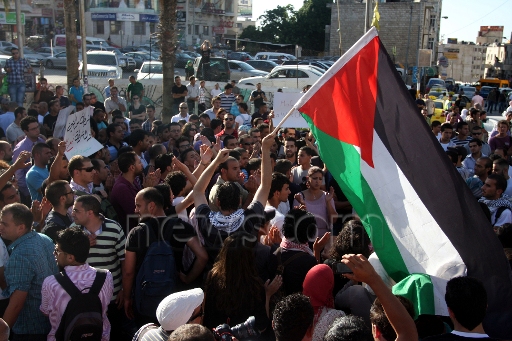Normally, the Western media giants deem Palestinian protesters clashing
with security forces newsworthy. Normally, the media takes a keen
interest in all developments and setbacks regarding Israeli-Palestinian
talks.
And so, the media's total lack of interest in recent Palestinian demonstrations against talks with Israel is noteworthy on two counts. Over the weekend, and continuing today, Palestinians have been demonstrating in Ramallah and in other West Bank locations. On Saturday, seven were arrested. Ten were hospitalized, including a local journalist beaten as he tried to cover the events.
The Palestinian Authority's Minister of the Interior has called for an investigation. But the major media outlets, usually so quick to run photos of Palestinian demonstrators, has almost entirely ignored the story. Not a word from the Washington Post, Los Angeles Times, CNN, New York Times, International Herald Tribune and others.
Editors, all too eager to print photos of Palestinians demonstrating against or clashing with Israeli forces, have lost their interest in the latest round of Palestinian protesters. The reason? Perhaps because the protesters are not facing off against Israeli soldiers, but against Palestinian police. Initially, they protested Palestinian plans (now cancelled) to meet with Israeli Vice Premier Shaul Mofaz.
The western media, usually saturated with images of Palestinian protesters, has virtually none of this weekend's clashes, which started as protests against engaging in peace talks with an Israeli, and which morphed into anti-(PA) police violence. Here are some of the protest images not covered by the international media:

Palestinian
protestors hold banners and national flags during a protest against a
scheduled meeting between Palestinian President Mahmoud Abbas and the
Israeli Vice Prime Minister Shaul Mofaz in the West Bank city of
Ramallah, on 01 July 2012. A senior Palestinian official announced that
the meeting had been postponed

Ramallah,
West Bank, Palestinian Territory - Palestinians help a wounded man,
injured in a protest against a scheduled meeting between Palestinian
President Mahmoud Abbas and the Israeli Vice Prime Minister Shaul Mofaz
in the West Bank city of Ramallah, on 01 July 2012. A senior Palestinian
official announced that the meeting had been postponed
CAMERA blog
The Ceasefire is open to the opinion of its readers. If you have another position related to the issue discussed above, submit your article for editor@cessarfogo.com . After evaluation and approval of the submitted material, it will be submitted for publication.
And so, the media's total lack of interest in recent Palestinian demonstrations against talks with Israel is noteworthy on two counts. Over the weekend, and continuing today, Palestinians have been demonstrating in Ramallah and in other West Bank locations. On Saturday, seven were arrested. Ten were hospitalized, including a local journalist beaten as he tried to cover the events.
The Palestinian Authority's Minister of the Interior has called for an investigation. But the major media outlets, usually so quick to run photos of Palestinian demonstrators, has almost entirely ignored the story. Not a word from the Washington Post, Los Angeles Times, CNN, New York Times, International Herald Tribune and others.
Editors, all too eager to print photos of Palestinians demonstrating against or clashing with Israeli forces, have lost their interest in the latest round of Palestinian protesters. The reason? Perhaps because the protesters are not facing off against Israeli soldiers, but against Palestinian police. Initially, they protested Palestinian plans (now cancelled) to meet with Israeli Vice Premier Shaul Mofaz.
The western media, usually saturated with images of Palestinian protesters, has virtually none of this weekend's clashes, which started as protests against engaging in peace talks with an Israeli, and which morphed into anti-(PA) police violence. Here are some of the protest images not covered by the international media:


CAMERA blog
The Ceasefire is open to the opinion of its readers. If you have another position related to the issue discussed above, submit your article for editor@cessarfogo.com . After evaluation and approval of the submitted material, it will be submitted for publication.

No comments:
Post a Comment